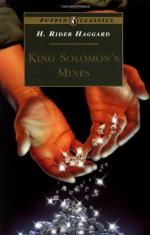Until Sir Henry uttered these words I do not think that the full horror of what had happened had come home to us, preoccupied as we were with the sight of poor Foulata’s end. But now we understood. The ponderous mass of rock had closed, probably for ever, for the only brain which knew its secret was crushed to powder beneath its weight. This was a door that none could hope to force with anything short of dynamite in large quantities. And we were on the wrong side!
For a few minutes we stood horrified, there over the corpse of Foulata. All the manhood seemed to have gone out of us. The first shock of this idea of the slow and miserable end that awaited us was overpowering. We saw it all now; that fiend Gagool had planned this snare for us from the first.
It would have been just the jest that her evil mind would have rejoiced in, the idea of the three white men, whom, for some reason of her own, she had always hated, slowly perishing of thirst and hunger in the company of the treasure they had coveted. Now I saw the point of that sneer of hers about eating and drinking the diamonds. Probably somebody had tried to serve the poor old Dom in the same way, when he abandoned the skin full of jewels.
“This will never do,” said Sir Henry hoarsely; “the lamp will soon go out. Let us see if we can’t find the spring that works the rock.”
We sprang forward with desperate energy, and, standing in a bloody ooze, began to feel up and down the door and the sides of the passage. But no knob or spring could we discover.
“Depend on it,” I said, “it does not work from the inside; if it did Gagool would not have risked trying to crawl underneath the stone. It was the knowledge of this that made her try to escape at all hazards, curse her.”
“At all events,” said Sir Henry, with a hard little laugh, “retribution was swift; hers was almost as awful an end as ours is likely to be. We can do nothing with the door; let us go back to the treasure room.”
We turned and went, and as we passed it I perceived by the unfinished wall across the passage the basket of food which poor Foulata had carried. I took it up, and brought it with me to the accursed treasure chamber that was to be our grave. Then we returned and reverently bore in Foulata’s corpse, laying it on the floor by the boxes of coin.
Next we seated ourselves, leaning our backs against the three stone chests which contained the priceless treasure.
“Let us divide the food,” said Sir Henry, “so as to make it last as long as possible.” Accordingly we did so. It would, we reckoned, make four infinitesimally small meals for each of us, enough, say, to support life for a couple of days. Besides the “biltong,” or dried game-flesh, there were two gourds of water, each of which held not more than a quart.
“Now,” said Sir Henry grimly, “let us eat and drink, for to-morrow we die.”
We each ate a small portion of the “biltong,” and drank a sip of water. Needless to say, we had but little appetite, though we were sadly in need of food, and felt better after swallowing it. Then we got up and made a systematic examination of the walls of our prison-house, in the faint hope of finding some means of exit, sounding them and the floor carefully.




